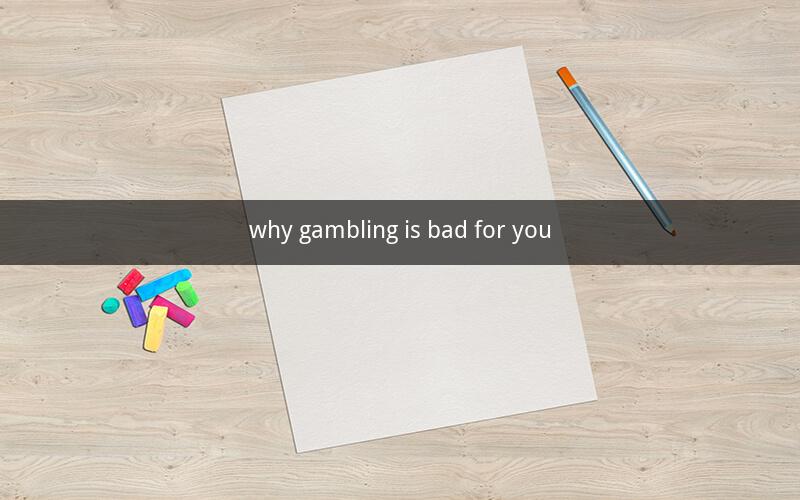
Why Gambling is Bad for You: Understanding the Risks and Consequences
Table of Contents
1. Introduction to Gambling
2. The Psychological Impact of Gambling
3. Financial Consequences of Gambling
4. Social and Family Effects
5. Legal and Ethical Issues
6. Addiction and Its Effects
7. Prevention and Support
8. Conclusion
1. Introduction to Gambling
Gambling has been a part of human culture for centuries, with various forms of betting and gaming available across the globe. While it can be entertaining and a source of income for some, it is essential to understand why gambling can be detrimental to individuals.
2. The Psychological Impact of Gambling
Gambling can have a profound psychological impact on individuals. The thrill of winning and the anticipation of future gains can lead to increased stress levels, anxiety, and depression. For some, the need to gamble becomes an escape from reality, leading to a decline in mental health.
3. Financial Consequences of Gambling
One of the most immediate and significant risks of gambling is its potential to cause severe financial damage. Individuals may lose substantial amounts of money, leading to debt, financial ruin, and even bankruptcy. The desire to recover lost funds can drive individuals to continue gambling, exacerbating the financial burden.
4. Social and Family Effects
Gambling can have a detrimental effect on social and family life. Relationships may suffer due to financial stress, increased tension, and the time spent on gambling activities. Family members may feel neglected, and the individual's gambling behavior can lead to strained relationships and even family breakdown.
5. Legal and Ethical Issues
Gambling is subject to legal and ethical considerations. Illegal gambling can lead to criminal charges, while ethical concerns arise when individuals become addicted and are unable to control their gambling behavior. Additionally, the proliferation of gambling venues and the ease of online betting raise questions about the societal impact of gambling.
6. Addiction and Its Effects
Gambling addiction, also known as problem gambling or compulsive gambling, is a serious condition that affects millions of people worldwide. This addiction can lead to a wide range of negative consequences, including job loss, eviction, and even suicide. The psychological and physical toll of gambling addiction is profound and requires immediate attention.
7. Prevention and Support
Preventing gambling addiction and addressing its consequences require a multi-faceted approach. This includes education on the risks of gambling, the implementation of responsible gambling policies, and the availability of support services. Support groups, counseling, and therapy can provide individuals with the tools to overcome their gambling addiction.
8. Conclusion
Gambling, while a form of entertainment for many, can have devastating consequences. The psychological, financial, social, and legal impacts of gambling addiction are significant and should not be underestimated. By understanding the risks and taking steps to prevent and address gambling addiction, individuals can protect themselves and their families from the harmful effects of gambling.
---
Questions and Answers
1. Q: What are the psychological effects of gambling?
A: Gambling can lead to increased stress, anxiety, depression, and a sense of loss of control over one's life.
2. Q: How can gambling cause financial problems?
A: Gambling can lead to significant financial losses, which may result in debt, bankruptcy, and eviction.
3. Q: What social issues can arise from gambling addiction?
A: Gambling addiction can strain relationships, lead to neglect of family members, and contribute to family breakdown.
4. Q: Are there legal issues associated with gambling?
A: Yes, illegal gambling can result in criminal charges, and ethical concerns may arise from the societal impact of gambling.
5. Q: How does gambling addiction affect an individual's life?
A: Gambling addiction can lead to job loss, eviction, and even suicide, as well as significant mental and physical health issues.
6. Q: What can be done to prevent gambling addiction?
A: Prevention includes education on the risks of gambling, responsible gambling policies, and access to support services.
7. Q: Are there any support services available for gambling addiction?
A: Yes, support services include counseling, therapy, and support groups dedicated to helping individuals overcome gambling addiction.
8. Q: How can family members help someone with a gambling addiction?
A: Family members can provide support, encourage the individual to seek help, and be aware of the risks associated with gambling addiction.
9. Q: Can online gambling be more harmful than traditional gambling?
A: Online gambling can be more harmful due to its accessibility and the potential for anonymity, which may make it easier to develop an addiction.
10. Q: What is the most effective treatment for gambling addiction?
A: The most effective treatment often involves a combination of therapy, counseling, support groups, and lifestyle changes aimed at addressing the underlying causes of the addiction.